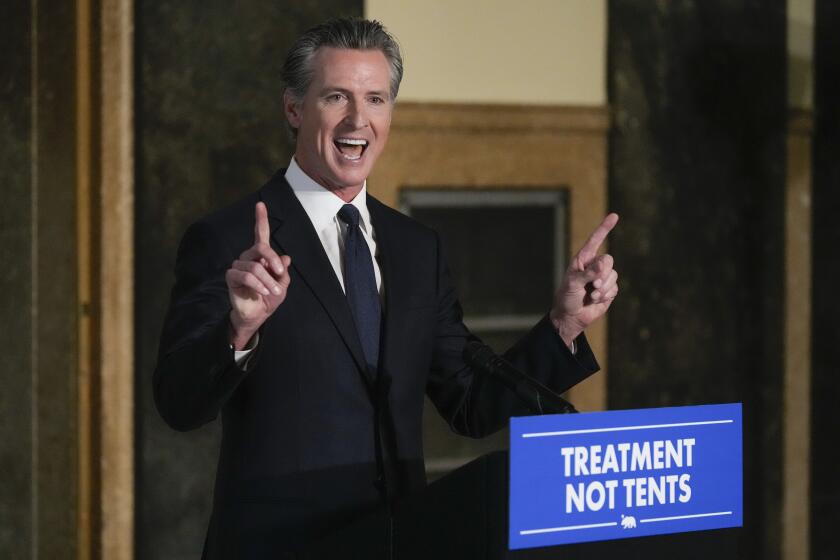Like Reagan, Schwarzenegger and Brown, Newsom uses veto pen to rein in spending by California lawmakers

- Share via
SACRAMENTO — It’s the job of a governor to play adult supervisor and not give adolescent state legislators all the spending money they’d like. Otherwise, they’d break the family bank.
All modern California governors have performed this role, often in different ways and frequently with relish.
Many, especially Republicans, have loved to use their “blue pencil,” striking individual spending items from the annual state budget before signing it. That’s a potent power California governors enjoy that U.S. presidents don’t even have.
Gov. Ronald Reagan cherished the “line item veto” and often lamented not possessing the tool as president.
Gov. Gavin Newsom, however, hardly ever picks up his blue pencil. He barely touches a spending plan before signing what he’s sent by the Democratic-controlled Legislature. That’s because he and legislative leaders already have negotiated the final version of the budget before lawmakers pass it.
Then what Newsom does to slow spending by lawmakers is to emulate his predecessor, Gov. Jerry Brown. He vetoes lots of spending bills that legislators pass after the budget is enacted.
It’s in legislators’ DNA to try to squeeze more dollars out of the state kitty after there’s already a spending plan in place for the year.
“They’re always asking for more,” Brown once said. “There’s no natural limit. There’s no predator for this species of budgetary activity except the governor.”
Lawmakers — Democrats, anyway — counter that it’s their constitutional right to keep dipping into the pot.
“Many of my colleagues have important issues they’re trying to tackle on behalf of their constituents and they have costs,” Assemblyman Evan Low (D-Campbell) told me. “Just as the governor has the right to veto bills, it is the Legislature’s right to send him bills as part of our democratic process.”
The governor’s moderate stances this year could help him refute a perception that he’s a wacky liberal from California.
But Newsom’s admonition to legislators — implanted in veto messages on dozens of spending bills he recently rejected — is that if they want to tap into the state vault, they’d better follow a protocol. They need to seek approval through the annual budget process that’s supposed to end on June 30.
Otherwise, spending veers out of control.
This was Newsom’s basic boilerplate lecture that he tucked into spending vetoes:
“We enacted a budget that closed a shortfall of more than $30 billion through balanced solutions that avoided deep program cuts...
“This year, however, the Legislature sent me bills outside of this budget process that, if all enacted, would add nearly $19 billion of unaccounted costs in the budget...
“With our state facing continuing economic risks and revenue uncertainty, it is important to remain disciplined.”
It was a strong message. But a little humor now and then wouldn’t have hurt. Previous governors showed some occasional wit in their bill signing or veto messages.
In inking a bill to legalize the stuffing and display of dead mountain lions, Brown wrote: “This presumably important bill earned overwhelming support by both Republicans and Democrats. If only that same energetic bipartisan spirit could be applied to creating clean energy jobs and ending tax laws that send jobs out of state.”
Gov. Arnold Schwarzenegger used a vulgar acrostic to veto a bill by an assemblyman who had heckled the Republican governor when he crashed a Democratic fundraiser. The second line of the message began with the letter “F” and lines six through eight started with the letters “y,” “o” and “u.”
Gov. Pete Wilson enjoyed vetoing a bill that called for a state study of how best to dispose of discarded fluorescent light tubes. “Question: How many new legislative bills does it take to study the disposal of light bulbs?” Wilson wrote. “Answer: One less than you think.”
California Gov. Gavin Newsom vetoed a bill on Saturday that would allow workers on strike to collect unemployment benefits after being on the picket line for two weeks.
Newsom recently signed 890 bills and vetoed 156 — a mediocre veto rate of 15%.
In 2008, Schwarzenegger vetoed a record 35% of the bills lawmakers sent him, calling it collateral damage for them being 85 days late passing a budget. That was when budgets required a two-thirds legislative vote. In 2011, it was lowered to a simple majority.
That year, tightwad Brown vetoed the entire budget. He complained it added billions of dollars in new debt to already red ink spending. It’s the only time an entire spending plan has been vetoed.
Regardless of Newsom’s tough veto message — and his restriction on when spending can be approved — he’s hardly a piker.
In his less than five years as governor, state spending has jumped by 53% — more than $100 billion, from the $203-billion budget Brown left him to $311 billion currently.
The governor’s office would not provide a total amount of spending that Newsom vetoed. His boilerplate language was used in 64 vetoes.
Neither would his spokespeople elaborate on the governor’s veto messages. Was it just about saving money? Or was that sometimes merely a cover for blocking policy he disliked?.
“Just about every bill that is on the governor’s desk has some cost to it,” says Assembly Budget Committee Chairman Philip Ting (D-San Francisco). “Most of the time the governor has a reason other than the spending [for a veto]. Sometimes he gives the budget excuse.”
One example: He vetoed a bill requiring high schools to provide free condoms for students. Was that just because of the “unfunded mandate” he cited? Or does the father of four children also question the policy?
Another: He vetoed a measure that would have provided unemployment insurance benefits for striking union members. He said the unemployment fund was already $20 billion in debt. But did he also think it was nuts to subsidize strikers who voluntarily walk off their jobs?
He vetoed a lot of spending bills that amounted to pocket change. And he was right.
Once there’s an agreed-upon budget, lawmakers shouldn’t squeeze taxpayers for more money except in a dire emergency.
More to Read
Sign up for Essential California
The most important California stories and recommendations in your inbox every morning.
You may occasionally receive promotional content from the Los Angeles Times.
















